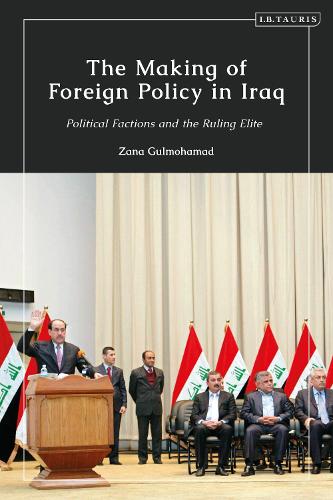
The Making of Foreign Policy in Iraq: Political Factions and the Ruling Elite
(Hardback)
Available Formats
Publishing Details
The Making of Foreign Policy in Iraq: Political Factions and the Ruling Elite
By (Author) Zana Gulmohamad
Bloomsbury Publishing PLC
I.B. Tauris
28th January 2021
United Kingdom
Classifications
Tertiary Education
Non Fiction
Political parties and party platforms
Military history: post-WW2 conflicts
Specific wars and military campaigns
Modern warfare
Politics and government
327.567
Physical Properties
Hardback
216
Width 156mm, Height 234mm
472g
Description
How is foreign policy made in Iraq Based on dozens of interviews with senior officials and politicians, this book provides a clear analysis of the development of domestic Iraqi politics since 2003. Zana Gulmohamad explains how the federal government of Iraq and Kurdistan Regional Government (KRG) have functioned and worked together since toppling Saddam to reveal in granular detail the complexity of their foreign policy making. The book shows that the ruling elites and political factions in Baghdad and in the capital of the Kurdistan Region, Erbil, create foreign policies according to their agendas. The formulation and implementation of the two governments foreign policies is to a great extent uncoordinated. Yet Zana Gulmohamad places this incoherent model of foreign policy making in the context of the countrys fragmented political and social context and explains how Iraqs neighbouring countries - Iran, Turkey, Saudi Arabia and Syria before the civil war - have each influenced its internal affairs. The book is the first study dedicated to the contemporary dynamics of the Iraqi state - outside the usual focus on the great powers - and it explains exactly how Iraqi foreign policy is managed alongside the countrys economic and security interests.
Reviews
A spirited and welcome book that contributes to our understanding of political dynamics in post-invasion Iraq. * Middle East Monitor *
'Dr Gulmohamads book challenges the common tendency to treat Iraq as a passive battleground for foreign powers. The book provides the most comprehensive account of the complex mechanisms that shape Iraqs foreign policy-making and how rival factions and elites try to stir Iraq in their interests. The focus on neighbouring states and their role in affecting policy-making in Iraq at the expense of the usual focus on Western powers is particularly refreshing and insightful. The research upon which the book is based is thorough, and the primary sources are numerous. I strongly recommend the book to anyone who wishes to understand Iraqs place in international politics post-2003.' * Yaniv Voller, University of Kent, UK *
Author Bio
Zana K Gulmohamad is a Teaching Associate in the Department of Politics and International Relations at the University of Sheffield where he completed his PhD and become a Fellow of the Higher Education Academy. He has published on Iraq and radical armed groups and contributed to the USs Strategic Multilayer Assessment.
